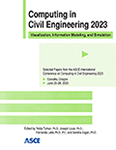Digital Twins of Bridges: Characteristics of a Framework Leading to Practical Implementations
Publication: Computing in Civil Engineering 2023
ABSTRACT
Digital twins are virtual counterparts of objects throughout their whole life cycle. This multi-industrial concept is gaining increasing interest, also in civil engineering, reflecting the interdisciplinary integration of industries. The virtual collaboration following the digital twinning idea will be based on multi-industrial standards, which forces a general paradigm not dedicated to an isolated industry. Therefore, also civil engineering community spotted the need for adopting comprehensive digital twinning. Nonetheless, the ongoing works still lack the principles driving the practical implementations. Therefore, this article proposes characteristics of digital twins of bridges. The proposed characteristics address the specificity of bridges and civil engineering practices but also follow general concepts of the digital twinning idea. The characteristics can be perceived as a part of a framework guiding the creation, utilization, and interpretation of digital twins of bridges.
Get full access to this article
View all available purchase options and get full access to this chapter.
REFERENCES
ARTBA. 2022. Bridge Report 2022.
Barbosa, F., J. Woetzel, J. Mischke, M. J. Ribeirinho, M. Sridhar, M. Parsons, N. Bertram, and S. Brown. 2017. Reinventing Construction: A Route To Higher Productivity. Mckinsey Glob. Insititute, (February): 20.
Barnabas, J., and P. Raj. 2020. “The human body: A digital twin of the cyber physical systems.” Adv. Comput., 219–246. Elsevier Inc.
Bauer, P., B. Stevens, and W. Hazeleger. 2021. “A digital twin of Earth for the green transition.” Nat. Clim. Chang. 2021 112, 11 (2): 80–83. Nature Publishing Group. https://doi.org/10.1038/s41558-021-00986-y.
Boje, C., A. Guerriero, S. Kubicki, and Y. Rezgui. 2020. “Towards a semantic Construction Digital Twin: Directions for future research.” Autom. Constr., 114 (January): 103179. Elsevier. https://doi.org/10.1016/j.autcon.2020.103179.
Boschert, S., and R. Rosen. 2016. “Digital Twin - The Simulation Aspect.” Mechatron. Futur. Challenges Solut. Mechatron. Syst. Their Des., 59–74. Springer International Publishing.
Deloitte. 2017. New Technologies Case Study: Data Sharing in Infrastructure.
de Freitas Bello, V. S., C. Popescu, T. Blanksvärd, B. Täljsten, and C. Popescu. 2021. “Framework for facility management of bridge structures using digital twins.” IABSE Congr. Ghent 2021 Struct. Eng. Futur. Soc. Needs, (January): 629–637. https://doi.org/10.2749/ghent.2021.0629.
Liew, A. 2013. “DIKIW: Data, information, knowledge, intelligence, wisdom and their interrelationships.” Bus. Manag. Dyn., 2 (10): 49–62.
Liu, M., S. Fang, H. Dong, and C. Xu. 2021. “Review of digital twin about concepts, technologies, and industrial applications.” J. Manuf. Syst., 58 (PB): 346–361. Elsevier Ltd. https://doi.org/10.1016/j.jmsy.2020.06.017.
Martin, R. C. 2002. Agile Software Development, Principles, Patterns, and Practices. Pearson.
Qi, Q., F. Tao, T. Hu, N. Anwer, A. Liu, Y. Wei, L. Wang, and A. Y. C. Nee. 2021. “Enabling technologies and tools for digital twin.” J. Manuf. Syst., 58 (PB): 3–21. Elsevier Ltd. https://doi.org/10.1016/j.jmsy.2019.10.001.
Research and Markets. 2021. Digital Twin Market Research Report: By Type, Technology, Enterprise, Application, Industry - Global Industry Analysis and Growth Forecast to 2030.
Sacks, R., I. Brilakis, E. Pikas, H. S. Xie, and M. Girolami. 2020. “Construction with digital twin information systems.” Data-Centric Eng., 1 (December). https://doi.org/10.1017/dce.2020.16.
Shafto, M., M. Conroy, R. Doyle, E. Glaessgen, C. Kemp, J. LeMoigne, and L. Wang. 2010. Modeling, Simulation, Information Technology & Processing Roadmap - Technology Area 11. Natl. Aeronaut. Sp. Adm.
Tao, F. E. I., and M. Zhang. 2017. “Digital Twin Shop-Floor: A New Shop-Floor Paradigm Towards Smart Manufacturing.” IEEE Access, 5: 20418–20427. https://doi.org/10.1109/ACCESS.2017.2756069.
Information & Authors
Information
Published In
History
Published online: Jan 25, 2024
ASCE Technical Topics:
- Architectural engineering
- Base isolation
- Bridge engineering
- Bridges
- Building information modeling
- Building management
- Business management
- Construction engineering
- Construction management
- Earthquake engineering
- Engineering profession
- Geotechnical engineering
- Industries
- Life cycles
- Organizations
- Practice and Profession
- Seismic design
- Standards and codes
- Structural engineering
Authors
Metrics & Citations
Metrics
Citations
Download citation
If you have the appropriate software installed, you can download article citation data to the citation manager of your choice. Simply select your manager software from the list below and click Download.
